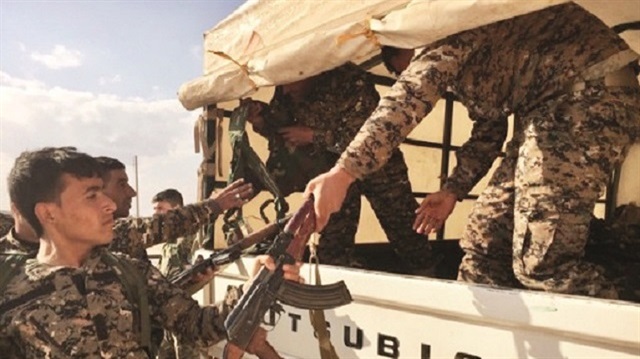
Washington provides weapons support to the YPG, which recruits children, including those under 15, in Syria, despite its strictly illegality according to UN statutes
The United States has been supporting war crime by closing its eyes to the Kurdistan Workers' Party (PKK) Syrian affiliate Democratic Union Party's (PYS) People's Protection Units (YPG) militia, which has been recruiting child soldiers and creating a new generation indoctrinated into its brutal ideology.
The Pentagon said there is nothing wrong with delivering weapons to the YPG and Syrian Democratic Forces (SDF) in Syria.
Responding to a question regarding the recruitment of child soldiers, Pentagon spokesman Navy Capt. Jeff Davis said that he had no knowledge regarding the issue. "I do not know if waging a war has an age limit," Davis said.
Also, a U.S. Central Command (CENTCOM) commander said there is no obstacle for children under 15 to be armed by the YPG.
The U.N. does not approve of armed groups recruiting people under the age of 18 under any circumstance.
Ankara has been expressing its frustrations regarding U.S. support of the PYD and its YPG and SDF, which all fight against Daesh.
The PKK is listed as a terrorist organization by the U.S. and EU. Since Turkey considers the PYD to be a PKK affiliate, Ankara says Washington should not cooperate with it.

Children armed by US
Previously, CENTCOM commander General Joseph Votel visited YPG and SDF terrorists in the northern Syrian town of Kobane.
Photos showed Votel giving the YPG and SDF a weapons shipment and talking about the upcoming Raqqa operation to oust Daesh from the city.
The photos also show that children were among the terrorists who were also armed by U.S.
Photos also show that the weapons were delivered in Cougar MRAP-type armored vehicles.
During his visit, Votel and the YPG and SDF agreed to concentrate on Manbij where Turkish military-backed Free Syrian Army (FSA) fighters are to conduct an operation soon to drive the PYD from the town.
[PK1]that even though it was not acceptable for someone under the age of 18 to be armed and sent to a war, given "the situation in the region and the cultural structure," it was not surprising.



